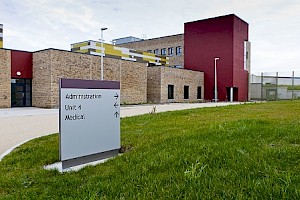Youth Justice
Ireland has a long history of poor responses to offending behaviour by children. A core strand to IPRT's work since its establishment in 1994 has been the promotion of a more effective youth justice system, with emphasis on non-custodial alternatives, diversion, early intervention and prevention strategies and programmes. Central to our work was ending the practice of detaining children in adult prisons, which was in breach of international human rights standards and a serious stain on Ireland's human rights record.
International human rights standards, and in particular the provisions of the UN Convention on the Rights of the Child, are clear that custody for children should only be used as a last resort and for the minimum required period of time. All efforts should be made to apply alternatives to detention to ensure that such a measure is only used in exceptional circumstances.
In Ireland, the Children Act 2001 recognizes the principle of detention as a last resort. The Act prohibits the imprisonment of children and the Criminal Justice Act 2006 makes provision for all children less than 18 years of age to be detained in Children Detention Schools. The detention school model is focused on a model of care, education, health and programmes that address offending, with improved outcomes for the young people, their communities and all of society. The Irish Youth Justice Service is responsible for the Children Detention Schools, within the Department of Children and Youth Affairs.
Following years of sustained advocacy by IPRT, along with many national and international bodies, in 2012 the detention of boys aged under 17 at St Patrick's Institution ended. In March 2017, a Ministerial Order ended the sentencing of children aged under 18 to adult prison in Ireland, and in April 2017, St. Patrick’s Institution was finally closed. Since September 2017 boys aged under 18 are no longer detained in the adult prison system.
IPRT continues to work towards progressive change in youth justice policies and practice, as well as engaging with wider policy and practice issues relating to youth justice, such as the provision of alternatives to detention, diversion and early intervention programmes.

Report highlights concerns over care for asylum seeking children.
19th November 2009
A report by the Ombudsman for Children, Emily Logan, highlights the inadequate service provision of care for asylum seeking children.
Young offenders in custody provided with an opportunity to influence UK Crime Policy.
19th November 2009
A project designed to provide an opportunity for young people in custody to influence government policy on juvenile justice will be launched next week.
Guardian: Putting victims at the heart of justice
2nd November 2009
In today's Guardian, Juliet Lyon details restorative justice schemes: "Growing the adult prison population of the future, rather than acting to put things right, does little or nothing to prevent the next victim of crime."
NI: Restorative Justice Scheme more effective than custodial sanctions.
29th October 2009
The Prison Reform Trust has found that the Northern Ireland Restorative Justice Scheme has been more effective at changing behaviour among young offenders than custodial sanctions.
Working Group on Children's Rights Standards for the National Children Detention Centre at Oberstown, Lusk, Co. Dublin
8th October 2009
The Working Group on Children's Rights Standards for the National Children Detention Centre at Oberstown recommendations were from a consultation process with a range of stakeholders within and outside the criminal justice system in 2008.
Irish Times: Scheme sees drop in reoffenders
25th September 2009
A new scheme to manage hardened young offenders has seen a near two-thirds drop in reoffending levels, as reported in the Irish Times.
Standards for the Inspection of Prisons in Ireland - Juvenile Supplement
18th September 2009
This document is a supplement to the 'Standards for the Inspection of Prisons in Ireland' which Judge Michael Reilly published on 24th July 2009.
Reducing child imprisonment in England and Wales - lessons from abroad.
11th September 2009
A new report published by the Prison Reform Trust (UK) identifies a number of successful international approaches to reducing child and youth imprisonment and cutting crime.
Evening Echo: Young People and our Justice System
10th August 2009
In the first part of a six-day series on youth justice, 'Evening Echo' Security Correspondent Ann Murphy talked to IPRT on the issues surrounding detention of young people in Ireland.
Youth Justice: ‘Designing Effective Local Responses to Youth Crime’
14th July 2009
The Irish Youth Justice Service (IYJS) has published a new report ‘Designing Effective Local Responses to Youth Crime: A baseline analysis of the Garda Youth Diversion Projects’.




